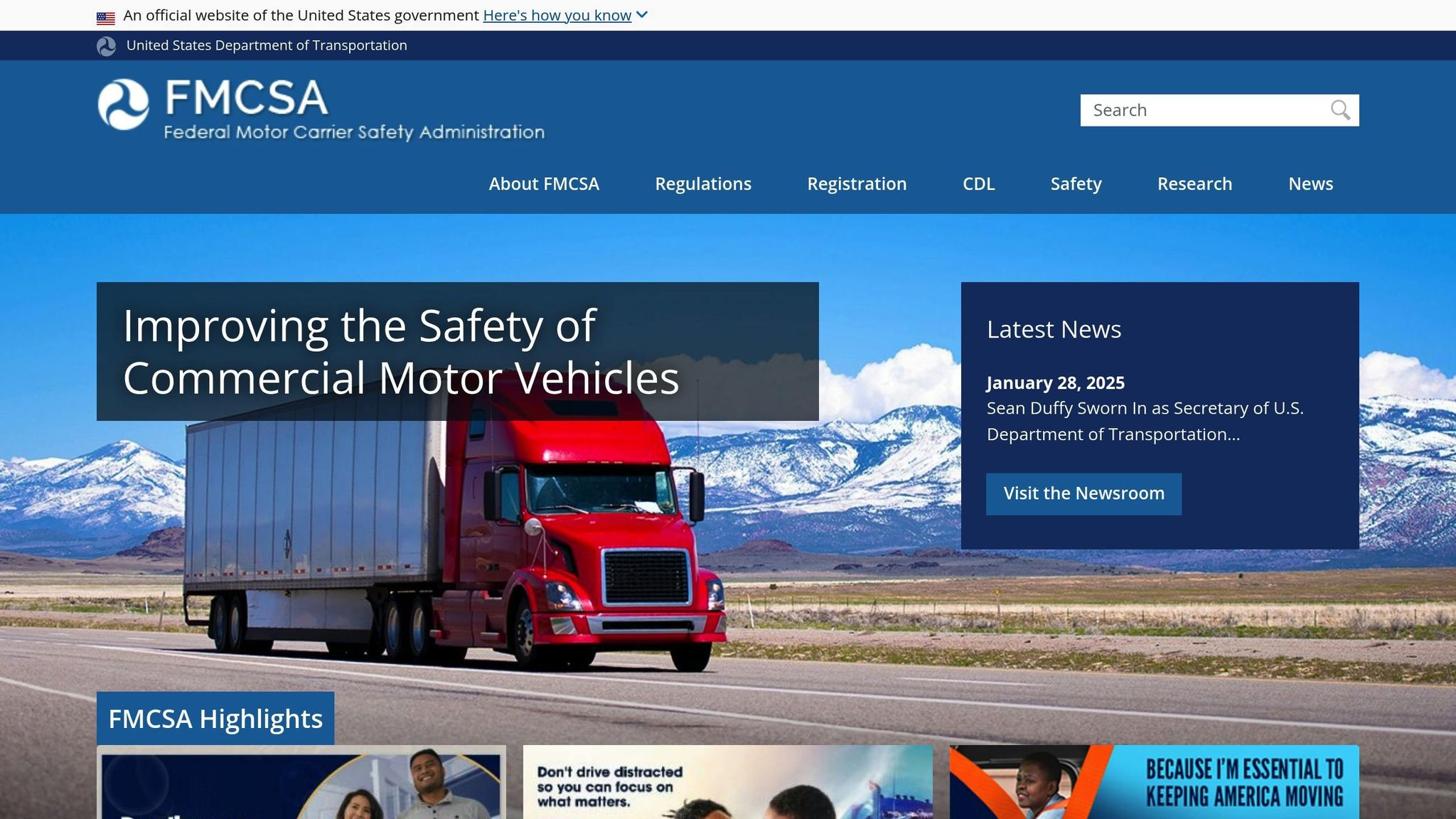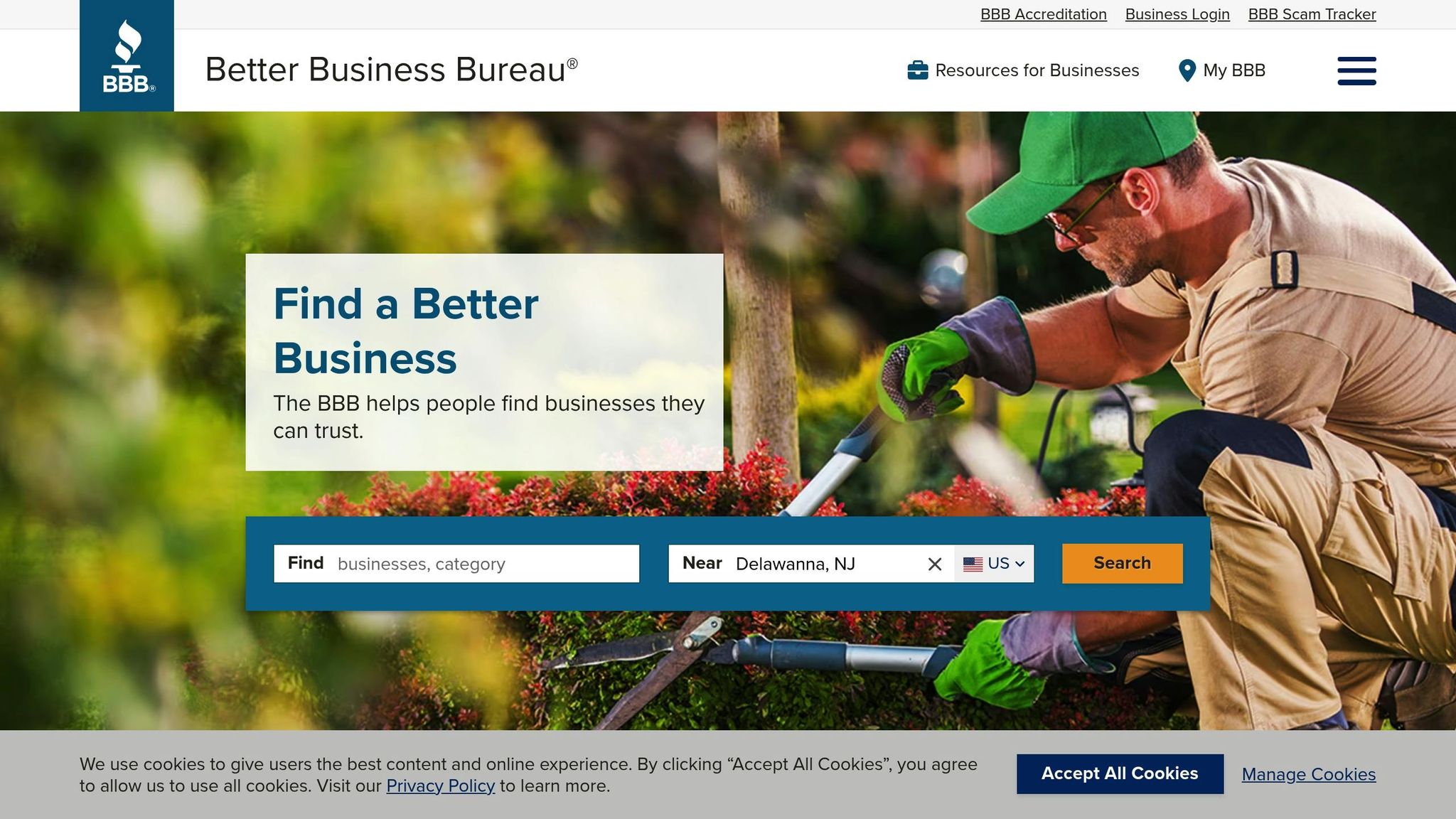FMCSA vs. BBB: Where to File Moving Complaints

When a move goes wrong, knowing where to file a complaint is crucial. The FMCSA (Federal Motor Carrier Safety Administration) and the BBB (Better Business Bureau) are two main options, each serving different purposes:
-
FMCSA: Handles regulatory issues for interstate moves, such as safety violations, deceptive pricing, or unlicensed movers.
- File if: Your mover violates federal laws or safety standards.
- How: Submit complaints online at nccdb.fmcsa.dot.gov or call 1-888-DOT-SAFT.
- Limitations: Cannot resolve personal disputes or compensation claims.
-
BBB: Focuses on service quality and mediating disputes like billing issues, damages, or poor customer service.
- File if: You have a local move or service-related issue.
- How: File complaints online at BBB.org.
- Limitations: Lacks regulatory power and cannot enforce resolutions.
Quick Comparison:
| Aspect | FMCSA | BBB |
|---|---|---|
| Type of Organization | Federal regulatory agency | Private dispute mediator |
| Jurisdiction | Interstate movers | Local and interstate movers |
| Focus | Licensing, safety, and compliance | Service quality, billing |
| Action Taken | Enforces laws, imposes penalties | Mediates, encourages response |
| Cost | Free | Free |
Tip: For interstate moves, start with FMCSA. For service issues, try BBB. Filing with both can strengthen your case. Always verify movers are licensed and insured using tools like MOD24 to avoid issues.
Missing or Broken Items? Here's How to File a Claim After ...
FMCSA Complaint Process

The Federal Motor Carrier Safety Administration (FMCSA) oversees interstate moving companies to ensure they operate within the law and prioritize safety.
What FMCSA Handles
FMCSA investigates issues involving interstate moving companies. Their primary focus is on companies meeting licensing requirements, following safety protocols, and conducting business ethically. Common violations include:
- Operating without a valid USDOT number
- Misleading pricing or deceptive service agreements
- Safety violations that risk public or driver safety
If you’ve encountered any of these issues, here’s how you can file a complaint with FMCSA.
Steps to File FMCSA Complaints
-
Gather Documentation
Collect important records, such as:- Bill of lading
- Written cost estimates
- Inventory lists
- Photos of damaged items
- Proof of payment
-
Choose a Filing Method
You can file your complaint through:Method Contact Details Online Portal nccdb.fmcsa.dot.gov Phone Hotline 1-888-DOT-SAFT -
Submit Complete Information
Provide all necessary details, including:- Your contact information
- The mover’s USDOT number
- Dates of service
- A detailed description of the violation
- Supporting documents
FMCSA’s Role: What It Can and Can’t Do
What FMCSA Can Do:
- Enforce federal regulations and impose penalties
- Revoke a company’s operating license
- Provide access to safety and compliance records
What FMCSA Cannot Do:
- Handle disputes related to billing or service quality
- Resolve individual monetary claims
- Require companies to issue compensation
FMCSA focuses on enforcing regulations, not resolving personal disputes. If your issue involves service quality or billing, you may need to pursue other options in addition to filing your complaint.
sbb-itb-290b89d
BBB Complaint Process

The Better Business Bureau (BBB) helps resolve disputes between customers and moving companies by acting as a mediator.
What BBB Handles
The BBB deals with various consumer complaints, including:
- Contract and billing disagreements
- Issues with service quality
- Lost or damaged belongings
- Misleading advertisements
- Problems with customer service
- Disputes over deposit refunds
Steps to File BBB Complaints
-
Review and Submit
- Check the mover’s BBB profile to verify business details; accreditation isn’t required.
- File your complaint online at BBB.org.
-
Provide Documentation
Include relevant documents such as:- Your moving contract
- Receipts
- Email or written correspondence
- Photos showing damages
- Cost estimates
-
Follow-Up
After submission, the BBB sends your complaint to the moving company, asks for their response, and facilitates communication. The time it takes to resolve issues can vary.
BBB Benefits and Limitations
| Aspect | Benefits | Limitations |
|---|---|---|
| Resolution Power | Helps mediate disputes | Cannot enforce decisions |
| Response Time | Encourages companies to reply | Some may ignore complaints |
| Cost | Free for consumers | No direct compensation |
| Scope | Focuses on individual cases | Lacks regulatory authority |
| Public Record | Keeps complaint history | Retention policies may vary |
The BBB is effective in opening communication between customers and moving companies and maintaining a public record of complaints. However, it does not have the authority to enforce resolutions. Up next, we’ll compare the BBB and FMCSA to help you decide which is the better option for your situation.
FMCSA vs BBB: Key Differences
Choosing where to file your complaint depends on the type of issue you're facing with your move. Here's a breakdown of how these two organizations handle moving-related complaints.
Side-by-Side Comparison
| Aspect | FMCSA | BBB |
|---|---|---|
| Type of Organization | Federal agency with regulatory enforcement powers | Private organization that mediates disputes |
| Jurisdiction | Focuses on interstate moving companies | Covers various businesses, including local movers |
| Cost to File Complaint | Free | Free |
| Action Taken | Investigates violations, enforces regulations, imposes fines | Mediates disputes between consumers and businesses |
| Public Information | Uses complaint data for regulatory purposes | Publishes complaint histories and business reviews |
When to Use Each Option
The chart above outlines the main differences between FMCSA and BBB. Depending on your situation, one may be better suited to address your complaint.
File with FMCSA if:
- Your move involves crossing state lines.
- The mover violates federal licensing or safety standards.
- Regulatory action is necessary.
File with the BBB if:
- Your issue concerns service quality or billing.
- The move is local.
- You’re looking for a mediated resolution.
For a stronger case, consider submitting complaints to both organizations. This can help ensure your concerns are addressed from multiple angles.
Conclusion
Filing complaints the right way can help you address moving problems more effectively. The FMCSA is your go-to for serious regulatory violations, particularly for interstate moves. On the other hand, the BBB is better suited for handling service-related disputes or local moving issues. Knowing which resource to use makes the process smoother.
To avoid problems altogether, work with licensed and verified movers. Platforms like MOD24, rated 4.6/5 from 370 reviews, only list movers who are licensed, insured, and verified, offering excellent customer support.
For filing complaints:
- FMCSA: For safety concerns, licensing issues, or interstate moves
- BBB: For service quality or local disputes
- Use both if the situation calls for it
- Keep detailed records of all interactions and documentation
According to MOD24, "Every featured mover is licensed, verified, and insured, ensuring a professional and secure moving experience."
Take the time to verify your mover's credentials through reliable sources like MOD24 to minimize issues before they happen.

FAQs About Moving to Tech Cities for Women
Moving to a tech city as a woman? Here's what you need to know upfront: Top Cities: San Francisco ...

Moving Industry Stats and Trends
Around 7,000 moving companies are handling nearly 14,000 locations across the US annually, and they ...

What Are the Positive and Negative Psychological Effects of Moving Frequently
Are you curious about the psychological effects of moving frequently or worried that relocations mig...